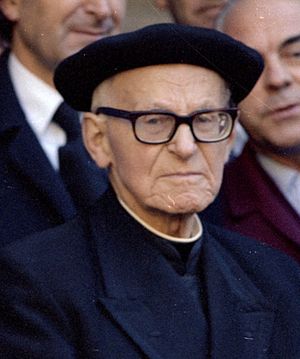Jose Migel Barandiaran facts for kids
Quick facts for kids
Jose Miguel Barandiaran
|
|
|---|---|
 |
|
| Born | 31 December 1889 |
| Died | 21 December 1991 (aged 101) Ataun, Basque Country, Spain
|
| Nationality | Spanish |
| Other names | On Joxemiel Aita Barandiaran |
| Occupation | Anthropologist, ethnographer, priest |
Basque: Jose Miguel Barandiaran Aierbe, also known as on Joxemiel Barandiaran or Aita Barandiaran, 'Father Barandiaran', was a very important Basque scientist. He was an anthropologist, which means he studied human cultures. He was also an ethnographer, someone who studies different groups of people and their customs. Besides his scientific work, he was also a priest.
Jose Miguel Barandiaran was born on December 31, 1889, and lived for a very long time, until December 21, 1991. He spent his life learning about and protecting the rich history and traditions of the Basque people.
His Early Life
Jose Miguel was born in 1889 in a traditional Basque farmhouse called Perune-Zarre. He was the youngest of nine children. His hometown was Ataun in the Basque Country.
When he was 14, his mother encouraged him to become a priest. He studied in Baliarrain and became a priest in 1914 in Burgos. The next year, he earned a degree in Theology. In 1916, he started teaching science at the Vitoria Seminary. He taught subjects like Physics, Chemistry, Geology, and the History of Religions. He taught there for 20 years and also held leadership roles, like being a vice-rector.
Studying Basque Culture
Soon after becoming a priest, Jose Miguel Barandiaran began his important work. Around 1916, he started studying Basque culture and old archaeological sites. He focused on the Aralar Mountains.
He did amazing research into old folk traditions. He collected many stories and tales about Basque mythology. His work helped us understand the ancient history of the Basque people.
In 1919, he presented his ideas about "Magismo" in Bilbao. A famous ethnologist named Wilhelm Schmidt was very interested. Schmidt invited him to an international meeting in the Netherlands in 1922. There, Barandiaran gave a talk called "The Religion of ancient Basques."
When the Spanish Civil War started in 1936, he had to leave Spain. He was seen as a suspect just because he was so dedicated to Basque culture. He lived in exile until 1953.
After returning from exile, he continued his important work. He started a special course at the University of Salamanca about Basque studies. The next year, in 1954, he created the Ethnology Seminar within the Aranzadi Science Society. After a break of 20 years, he started publishing his "Eusko Folklore Yearbook" again in 1955. This yearbook included studies on farming life and traditional crafts.
Awards and Recognition
In 1989, Jose Miguel Barandiaran received a special award. It was the Gold Medal for Merit in Fine Arts. This award came from the Spanish Ministry of Education, Culture and Sports. It recognized his great contributions to culture.
See also
 In Spanish: José Miguel de Barandiarán para niños
In Spanish: José Miguel de Barandiarán para niños
 | Roy Wilkins |
 | John Lewis |
 | Linda Carol Brown |

